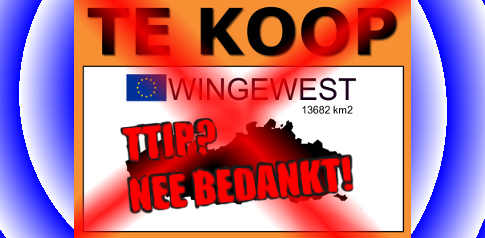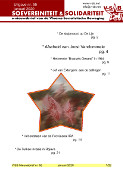Op 25 november nam de jaarlijkse John MacLean Rally plaats in Glasgow, Schotland, ter herinnering aan de Schotse republikeinse en socialistische politicus die in 1923 stierf en een groot voorstander was van een soevereine Schotse staat. Op de rally die georganiseerd werd door de Scottish Republican Socialist Movement, gaf Joost Vandommele een toespraak (in het Engels), die we met zijn goedkeuring hier integraal publiceren.
Flanders and Scotland have a lot in common. 2000 years ago, the territory which is now Flanders, was populated by Celts. Roman conquerors had a lot of difficulties with these Menapians, who maintained a guerrilla warfare for a long time. Scotland got traditionally English aggression against her independence and identity; In Flanders France took this very role. More than 125 times in history, French armies crossed the Flemish border… Consequently France became the traditional ally of Scotland and England that of Flanders. The Flemish alliance with England was very important because the Cotswold’s and the Yorkshire moors produced the high quality wool which was necessary for the production of the famous Flemish luxury cloth. Scotland also supplied wool via the ports of Leith and Berwick. Thousands of Flemish urban workers, the so called ‘blue nails’, earned their bread in the textile industry. Flanders became a laboratory of early industrial capitalism. The difference with modern capitalism was the lack of concentration of capital and labour. For example in the 15the century, in the international harbour of Bruges, the hotel Vanderbuerze stocked goods and noted each day the exchange rates.
In almost every actual language exists the word ‘beurs’; only Elisabeth I changed the word into ‘Royal exchange’. Flemish workers organized democratic mass rallies since 1127, established two times the republic, went on strike since 1250 for better living conditions and democracy. Also the ‘impoldering’, reclaiming land on the sea, improved democracy while the smallest mistake of an individual could provoke a general catastrophe for all. Flemish urban textile workers formed also part-time militia with many thousands fighters. In the same period as Stirling bridge and Bannockburn, free Flemish peasants and workers militias destroyed in 1302 the French royal chivalry army, the biggest in the Christian world. Like in Scotland they could only delay the imperialist claim on their country. Also in the Middle ages, many Flemish textile workers emigrated to Scotland where they introduced advanced weave technology. When the English king Edward I massacred Berwick in 1297 and murdered thousands of weavers, there were a lot of Flemish amongst the victims. Also in the higher classes the names Fleming and for instance ‘Freskin the fleming’ are significant. Since 1066 Flemish feudals seized a lot of properties in England and Scotland, because William the conquerors father in law, count Baldwin V of Flanders, provided a lot of men en warships for the crossing and this was their reward… As in Scotland and Ireland, Protestantism was the ideology of the oppressor, in Flanders it was the ideological element in the establishment of early capitalism and national resistance against the Spanish in the 16th century. As Holland stayed free after the Dutch war of independence, Flanders stayed in the hands of Spanish inquisition and bled to death (1585). Flanders lost her elites, capital and industrial know how, so Holland and England took over it’s vanguard role in the development of capitalism. Where king Billy triumphed in Ireland in 1691, he lost before, in 1677 in Flemish Kassel against the French king Louis XIV, where we lost French Flanders forever. Flanders stayed for centuries in an atmosphere of inquisition, poorness, ignorance and isolation in all domains of society. It missed the industrial revolution completely, so the Flemish people became even more extremely reactionary. In the Napoleonic time, an industrial spy, called Lieven Bauwens, smuggled new industrial technology, like power looms and steam engines out of England. The town of Ghent became soon ‘the so called Manchester of the continent’, an industrial isle in rural Flanders. Like in the middle ages the textile workers organized, and in Ghent the first unions of Flanders and even of Belgium were established in 1857. In 1848 the composer of the international Hymn, Pierre De Geyter was born in Ghent. In 1998 I organized a successful campaign for a statue on his behalf. One significant difference with the Scottish situation is the position of the national language. Although in 1830, Belgium was designed to be a frenchspeaking nation, the Flemish dialects survived the 19th and the 20th centuries, because the lower classes didn’t abandon it. The unification of the different Flemish dialects to the written Dutch language is an official fact since longtime but in practice the dialects are still strong… The francified metropolis of Brussels and of cultural Anglo-American globalization keeps our identity under a lot of pressure.
Of course we saw thousands of young Scots dying in Flanders in both world wars, especially in the trenches of the first World war. Just like the Irish, radical Flemish nationalists worked together with the Germans to obtain independence. Amongst these, there was the young socialist, and later communist leader Jef Van Extergem, who was for a lot of matters in the position of John Maclean here. Van Extergem was an admirer of my grandfather ,who was in those days the national poet of flanders (some called him the Flemish Robert Burns) and shadow minister in a symbolic Flemish government during WW I. Comrade Jim Clayson will translate and publish some of his poetry. Van Extergem, than leader of the Flemish communist party, died in a German concentration camp in march 1945, some weeks before the end of the war. Because the Belgian democracy systematically minorises the Flemish majority and denies Flemish rights and kept nearly no democratic option open for them; rightwing Flemish nationalism turned to the Nazi’s. The 2nd WW was a black period for the movement. Nowadays, Flemish nationalism is very strong actualy, but its leadership is Tory-minded. Remember the visit of Bart De Wever the NVA –leader, to David Cameron… We, the left Flemish nationalists, admire your movement and hope to maintain fruitful contacts in the future. If you are interested to visit our country and some sites who might be important to leftwing Scots nationalists, this can be arranged. Otherwise, maybe next year we can organize here some power point about all this. It’s up to you!
Long live the socialist republics of Scotland and Flanders!








